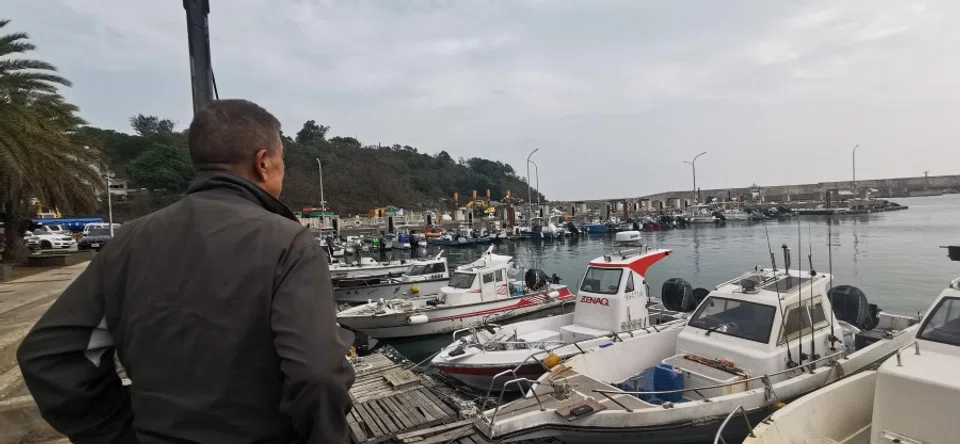Capsizing incident highlights fierce competition between Kinmen and Xiamen fishermen
The waters around Kinmen have long been coveted by fishermen from both sides of the Taiwan Strait for the priceless yellow croakers. However, the recent capsizing of a mainland Chinese fishing boat has sparked a fresh round of tension, with the mainland public dissatisfied with the Taiwan authorities' fishing restrictions against mainland fishermen. Lianhe Zaobao correspondent Woon Wei Jong speaks with the local fishermen in Kinmen to find out more.

The waters around Kinmen are known for wild yellow croakers; local fishermen say that the price of the fish doubles during festivals and holidays. Mainland Chinese fishermen often illegally fish in these waters, and encounters with enforcement vessels can easily lead to accidents.
Fishing for 'gold of the sea'
On the afternoon of the fifth day of the Chinese New Year on 14 February, a mainland Chinese speedboat entered an area 0.86 nautical miles (about 1.6 kilometres) off Beiding Island located southeast of Kinmen, and capsized after being pursued by a Taiwanese coast guard vessel. Four people fell overboard, and two of them died despite medical rescue efforts.
The incident sparked tensions for over ten days, with no resolution after eight rounds of negotiations. During my visit to Kinmen, I found that the dispute between the fishermen from Xiamen and Kinmen over the high-priced wild yellow croakers had been brewing for quite some time, laying the groundwork for conflict.
Kinmen, with its 12 islands, is the Taiwan county closest to mainland China. Its city centre is only 10 kilometres from Xiamen but 210 kilometres from Taiwan's main island.
... a wild yellow croaker weighing 1.5 to 2 kilograms can sell for over 10,000 RMB (about US$1,389).

At Luocuo Fishing Port in Little Kinmen (小金门, also known as Lieyu 烈屿), five kilometres from Xiamen city and the central point between Kinmen and Xiamen, local fishermen said that wild yellow croakers from the nearby waters of Kinmen are often priced 100 times higher than farmed ones. During the Dragon Boat Festival, Mid-Autumn Festival and Chinese New Year, the yellow croakers are exceptionally plump and delicious, fetching even higher prices.
Due to years of overfishing, the once plentiful wild yellow croakers have become increasingly rare, driving prices sky-high and earning them the nickname "gold of the sea". Mainland Chinese media have reported that a wild yellow croaker weighing 1.5 to 2 kilograms can sell for over 10,000 RMB (about US$1,389).
Different fishing methods
Some fishermen believe that the drastically different fishing methods employed by fishermen from Xiamen and Kinmen have sown the seeds of conflict in these waters.
... fishermen from Xiamen and Fujian typically cast nets, capturing all types of fishes. In contrast, Kinmen fishermen use hooks... - Li, a fisherman from Taiwan
A 75-year-old fisherman surnamed Li, who declined to give his full name, said that fishermen from Xiamen and Fujian typically cast nets, capturing all types of fishes. In contrast, Kinmen fishermen use hooks, allowing local fishery resources to recover while ensuring better protection for the abundant yellow croaker resources in the waters around Kinmen.

According to Li's observations, mainland Chinese fishermen often anchor and cast nets to catch the expensive yellow croakers in Kinmen's waters when Taiwanese coast guard vessels go on a midday break or are absent. After casting their nets, the mainland Chinese fishermen would leave quickly in their powerful speedboats and then come back for the nets after 30 to 60 minutes.
Li also said that when Taiwanese coast guard vessels spot these fishing boats, the coast guards would engage in high-speed pursuits and attempt to board and inspect the fishing boats, which over time "can easily lead to accidents".
Mainland public's reaction
There were past incidents of mainland fishing boats that crossed into Kinmen waters to fish, only to be expelled or detained. A mainland fishing boat with five crew members was also said to have entered restricted waters on 28 November 2023, and despite the attempt to escape, the boat and catch were seized and its crew were detained and fined by the Kinmen coast guard.
According to data from Taiwan's Coast Guard Administration (CGA), in the last eight years, there were more than 9,100 mainland fishing boats expelled for crossing the borders to fish or steal sand, with nearly 400 vessels detained and more than 80 vessels confiscated. The recent Kinmen capsizing incident this month is believed to be the first recorded death of a fisherman as a result of a CGA pursuit.
... the mainland views the Taiwanese as their compatriots and do not restrict Taiwanese fishermen from fishing in any waters around the mainland.

Meanwhile, the mainland public is dissatisfied with Taiwan's expelling of mainland fishing boats, because in comparison, the mainland views the Taiwanese as their compatriots and do not restrict Taiwanese fishermen from fishing in any waters around the mainland. At the same time, mainland officials have long tacitly acknowledged the existence of a line between Kinmen and Xiamen, and respected Taiwan's administrative jurisdiction over the area.
This capsizing incident has led Beijing to publicly deny any prohibited or restricted waters. The mainland's Taiwan Affairs Office stated on 17 February that since ancient times, fishermen from both sides of the strait have been operating in the traditional fishery zones of the strait, and that there has never been such a thing as "off-limit" or "restricted" waters in the zones.
Concerns over Kinmen fishermen's livelihood
On the day of my visit, the Luocuo Fishing Port at Little Kinmen was filled with more than one hundred fishing boats. A fisherman said that in recent days the sea breeze was relatively strong with turbulent tides, so the fishermen did not go out to sea. But he also revealed that after the capsizing incident, CGA officials would board fishing vessels headed out to sea to advise the fishermen to not cross the borders when fishing.
Lo De-sheng (70), former chair of the Luocuo community, stated that after the incident, vessels of the mainland coast guard, marine surveillance and fishery administration department, all stepped up their administration in the Kinmen-Xiamen waters. Lo was worried that Kinmen fishermen would be too afraid to venture out far to fish at sea, thus affecting their catch and even leading to a decline of the local fishing industry.
... authorities from both sides of the strait should avoid politicising the capsizing incident and aim for pragmatic negotiations over the matter. - Lin Mao-lin, Founder, Kinmen Cross-Strait Consensus Association

Lin Mao-lin, founder of the Kinmen Cross-Strait Consensus Association, also feared that besides having an impact on the livelihood of the fishermen, the collision incident would lead to another suspension of the "mini three links" (小三通).
Mini three links affected?
The mini three links refer to direct links of transportation, trade and postal with the mainland's Xiamen and Mawei through Taiwan's offshore islands of Kinmen and Matsu. They were implemented on 2 January 2001 but later suspended for three years from early 2020 due to the pandemic, before resuming again in early 2023.
Lin said that with their vibrant people-to-people exchanges, Kinmen and Xiamen in Fujian could be considered one close-knit ecosystem serving as a link connecting both sides of the Taiwan Strait. It had been difficult to relaunch the mini three links, and tensions between people on both sides of the strait would likely escalate if deteriorating cross-strait ties forced the suspension of the direct links once more.
He hoped that Beijing would continue to maintain its grand strategy of peaceful development and continue to spur linkages between Xiamen and Kinmen; authorities from both sides of the strait should avoid politicising the capsizing incident and aim for pragmatic negotiations over the matter.
This article was first published in Lianhe Zaobao as "金门渔民:野生黄鱼应节价飙 大陆渔民经常越界捕捞".





![[Photos] Fact versus fiction: The portrayal of WWII anti-Japanese martyrs in Taiwan](https://cassette.sphdigital.com.sg/image/thinkchina/3494f8bd481870f7c65b881fd21a3fd733f573f23232376e39c532a2c7593cbc)